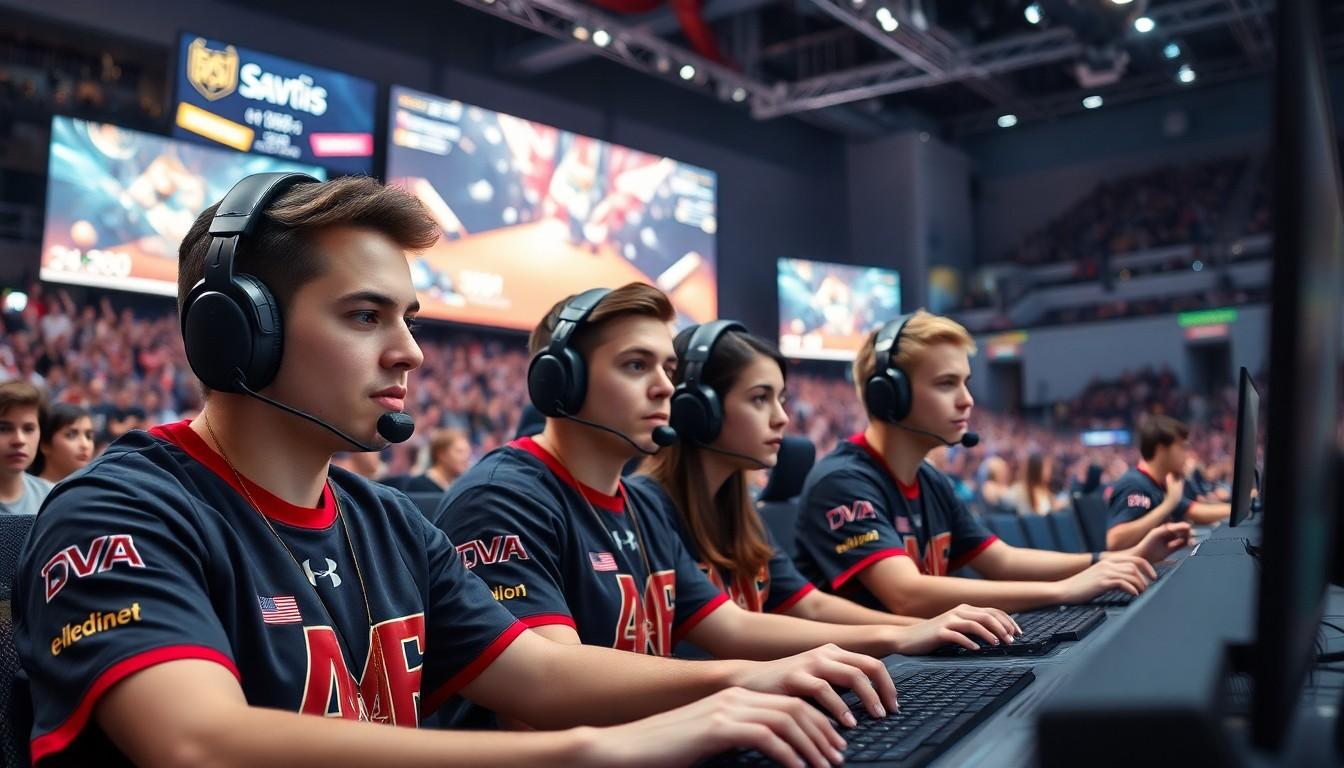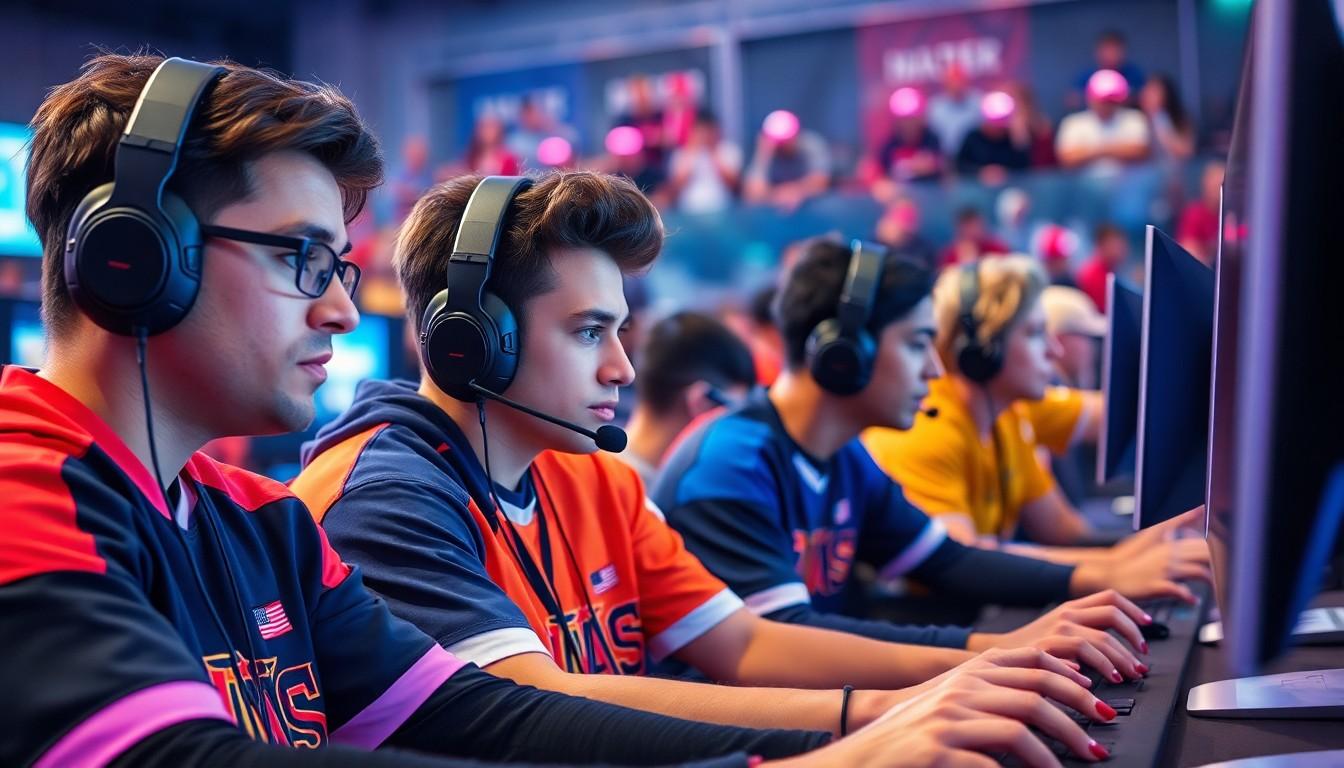The Best Fluffy Pancakes recipe you will fall in love with. Full of tips and tricks to help you make the best pancakes.

Top Esports Teams: Discover the Champions Reshaping the Gaming World
In the fast-paced world of esports, where strategy meets skill, a few teams rise above the rest, leaving their mark on the digital battlefield. From nail-biting tournaments to jaw-dropping plays, these top esports teams have transformed gaming into a global phenomenon. They’re not just playing games; they’re rewriting the rules and making history, one pixel at a time.
Top Esports Teams
Top esports teams play a crucial role in the competitive gaming landscape. Organizations such as Team Liquid, Cloud9, and Fnatic dominate various gaming titles. These teams showcase exceptional skill, strategic depth, and teamwork during high-stakes tournaments.
Diverse games like League of Legends, Dota 2, and Counter-Strike: Global Offensive involve these elite teams. Each squad features players with specialized roles, contributing to their overall success. Over the years, they’ve garnered thousands of fans, creating dedicated communities online.
Major tournaments offer an opportunity for these teams to shine. The International for Dota 2 attracts millions of viewers each year, underscoring the global appeal of competitive gaming. Prize pools often exceed millions, reflecting the substantial investment in esports.
Successful teams invest in rigorous training regimens. Daily practice sessions, analysis of gameplay strategies, and mental conditioning create a competitive edge. Talent scouting also plays a pivotal role; teams recruit promising players from amateur circuits to maintain excellence.
Sponsorships and partnerships significantly enhance the reach of top teams. Collaboration with brands like Intel and Red Bull provides financial backing and resources. This support allows teams to focus on performance, further solidifying their positions in the esports hierarchy.
Esports leagues, including the Overwatch League and the Call of Duty League, promote competitive integrity. These leagues foster a structured environment for consistent competition among top teams. Rankings evolve continuously, driven by performance in tournaments and seasons, highlighting the dynamic nature of the esports ecosystem.
Criteria for Evaluation

Evaluating top esports teams involves analyzing several key criteria. This approach ensures a comprehensive assessment of their effectiveness in the competitive gaming arena.
Team Performance
Team performance reflects success in tournaments, match outcomes, and overall win rates. Metrics such as game statistics, in-game strategy execution, and adaptability during matches provide insights. High placement in prestigious tournaments like The International indicates strong competitive standing. Consistent results across various games demonstrate resilience and strategic depth, critical for sustained success. Overall, analyzing a team’s track record offers a clear picture of its competitive prowess.
Player Skill Level
Player skill level plays a crucial role in a team’s performance. Individual proficiency in mechanics, decision-making, and teamwork defines the quality of players. Consistent top-tier performances in ranked matches indicate exceptional skill. Noteworthy players often earn accolades and recognition within the gaming community, showcasing their impact. Evaluating player statistics and contributions in matches highlights how their skills elevate team performance.
Fan Engagement
Fan engagement significantly enhances a team’s influence in the esports industry. Active online communities, social media presence, and fan interactions indicate strong loyalty and support. Successful teams leverage platforms like Twitch and YouTube to connect with fans, providing exclusive content and insights. Merchandise sales and event attendance also reflect fan interest and commitment. By fostering a genuine connection with their audience, teams strengthen their brand and community ties.
Notable Top Esports Teams
Several top esports teams continually showcase exceptional skill and strategic capability within the competitive gaming arena. Noteworthy organizations regularly dominate various popular titles, each with their unique achievements and contributions.
Team A: Overview and Achievements
Team Liquid stands out as a powerhouse in esports, celebrated for its success across multiple titles such as Dota 2, League of Legends, and Counter-Strike: Global Offensive. Achievements include victory at The International 2017 in Dota 2, where they secured a staggering $10 million prize. Known for their rigorous training regimen, this team emphasizes teamwork and adaptability in high-stakes environments. With a dedicated fan base, they maintain a strong social media presence, strengthening community ties.
Team B: Overview and Achievements
Cloud9 emerges as a prominent player in the esports scene, revered for its diverse roster and competitive achievements. Highlights include their triumph in the ELEAGUE Major 2018, which positioned them as one of the best teams in Counter-Strike: Global Offensive. Their multifaceted approach involves scouting fresh talent and nurturing them through rigorous training programs. Engaging with followers online, they foster a sense of belonging and loyalty among fans.
Team C: Overview and Achievements
Fnatic holds a remarkable reputation in esports, particularly known for its success in League of Legends and Counter-Strike: Global Offensive. The team claimed multiple championships, including their significant win at the 2011 League of Legends World Championship. Strategy and gameplay analysis remain core components of their training practices. As one of the oldest organizations, they boast a rich history and dedicated fan community, sustaining their relevance across the industry.
Impact on the Esports Industry
Top esports teams significantly shape the gaming landscape. Their influence extends across various areas, notably sponsorship, revenue, and community growth.
Sponsorship and Revenue
Sponsorship deals form a core component of esports revenue. Significant brands like Intel and Red Bull team up with top organizations, providing funds and resources that enhance team performance and visibility. These partnerships boost not just operational capabilities, but also elevate esports’ profile in mainstream media. Revenue generated from sponsorships contributes to expanding team rosters and improving training facilities. Teams often secure multi-million-dollar deals, reflecting the industry’s lucrative potential. Increased financial support enables greater investment in player development and infrastructure, further driving talent retention and acquisition.
Community Growth
Community growth thrives alongside top esports teams. Dedicated fan bases form energetic online communities, fostering interaction and loyalty. Platforms like Twitch and Discord serve as hubs for fans to engage with players and teams alike. Teams actively cultivate strong social media profiles, reaching millions globally. Engagement strategies like livestreams, Q&A sessions, and fan meetups enhance this connection. As a result, success on the virtual battlefield translates into real-world relationships, uniting fans around shared interests. This growing community not only supports teams but also contributes to the overall thriving esports ecosystem.
The rise of top esports teams has transformed the gaming landscape into a vibrant and competitive arena. Their strategic mastery and impressive teamwork not only captivate audiences but also set new standards in professional gaming.
As these organizations continue to thrive through rigorous training and community engagement, they reinforce their positions at the forefront of the industry. With substantial sponsorships and a growing fan base, the influence of these teams extends beyond the screen, fostering a culture that celebrates skill and dedication.
The future of esports looks promising as these teams pave the way for innovation and excitement in competitive gaming.
